
*
The bar that sprawled across the New York Theatre Workshop stage Dec. 6 was wide open to first-nighters, and drinks were on the house. Then — once Once had run its Act One course — the audience resumed its pre-show party position, returning to the stage at the intermission for more free-pouring and free-flowing.
"We'll continue that drink policy when the show goes to Broadway," promised John N. Hart Jr., one of the lucky seven producers who announced right before the show began its Off-Broadway run that it would indeed go to Broadway, starting previews Feb. 28 for a March 18 opening at the Bernard B. Jacobs Theatre.
Once comes from the same-named 2007 cult-hit film, with a slightly expanded song score by Glen Hansard and Markéta Irglová and huge chunks of director John Carney's original script (left intact by adapter Enda Walsh). It's your basic Guy meets Girl story — that's their sole identification in the film and play — he is a Dublin busker, and she is a Czech immigrant, and a mutual love of music pulls them into a romantic relationship that is not meant to last.
Such is the power of love and of music. You need look no further than their big hit from the film, "Falling Slowly," an urgent, surging, hypnotic power-ballad that won Hansard and Irglová an Academy Award for Best Song. It also helped their $150,000 Irish indie, shot in 17 days, to gross more than $20 million worldwide.
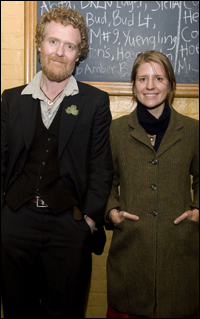 |
||
| Glen Hansard and Markéta Irglová |
||
| photo by Monica Simoes |
It prompted Irglová to reflect on how "Falling Slowly" fell into place: "I remember Glen had this idea for the verse, and he was humming that and picking it out on the guitar in the kitchen of my parents' house. I said, 'Wow! What's that?' because it sounded really pretty, and he said, 'Oh, it's just an idea. It's not really a song or anything.' I said, 'You should work on that.' He said, 'Okay, help me with it. Let's sit down at the piano.' And from that we rewrote the bridge and the chorus, and I started singing the harmony." Two crucial contributions that Irglova made: the three-note jump in the main theme — and she thought it sounded better on his voice.
Between both Onces falls "The Swell Season," a black-and-white documentary that chronicles the three-year U.S. tour Hansard and Irglová did with their band, The Swell Season. Its filmmakers (Nick August-Perna, Chris Dapkins and Carlo Mirabella-Davis) also chronicle where love has gone — how the movie-made sweethearts fall out of love during the rigors of the road.
Irglová, in fact, married another in June, Tim Iseler, a music engineer who engineered her first record last January. It was released in October under the title of "Amar," which is the Persian word for pomegranate. Next, she said, she'll "record another album in March and do some shows with my band. Glen's just making his own records as well in New York, but I don't know when that's coming out."
The two sat together at the premiere, beside their respective partners, and kept a cool demeanor throughout. "I wasn't nervous, but I was really excited," she said. "I felt very honored and proud. In my mind, I kept going, 'Thank you. Thank you for having been blessed with the movie, having been blessed with the music, having been blessed with this play, having been blessed with meeting Glen and John Carney. And now these actors, really beautiful people, who are pouring their own hearts into it."
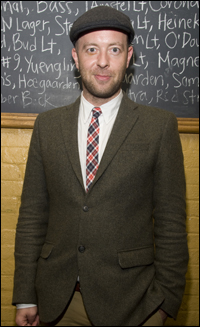 |
||
| John Tiffany |
||
| photo by Monica Simoes |
Hansard also praised the documentary-makers who recorded the end of the affair. "It was very good of the lads. They were very gentle with us because there were scenes they could have used that they didn't. Generally speaking, myself and Markéta's relationship is very gentle. Even when it's rocky, it's kinda gentle.
"Our friendship has gotten stronger and stronger. Any relationship, whether it's friendship or a romantic relationship, requires honesty — and continued honesty — and, if you can be continually honest with your lover even when it's no longer, then you have a chance at something even greater, which is friendship. I'm not just saying this as a cop-out, but myself and Markéta always made better friends."
It photographed much like love in the original film. "All we knew when we were filming was: Does this feel authentic? Every time I filmed a scene, it was: Is this being authentic? Is this being believable? Because, if it doesn't, we shouldn't do it.
"That's why they never kissed. We found ourselves getting to a point where it was, like, 'You know what? If there are a couple of kisses now and this is a happy ending, it kinda undoes the whole thing.' So there was a sense in the end that we shouldn't kiss. Thank God, John is such a great director, but he's also a great listener and he's a great man for having the conversation. Eventually, we decided they shouldn't kiss.
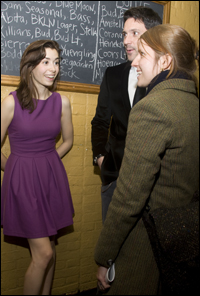 |
||
| Cristin Milioti, Steve Kazee and Markéta Irglová |
||
| photo by Monica Simoes |
Both confessed it was kinda "surreal" seeing facsimiles of themselves (the aforementioned Guy and Girl) on stage, played by Steve Kazee and Cristin Milioti, both relatively new to the New York theatre scene.
Mike Nichols tapped Kazee to read with actors auditioning for Spamalot and thought he read well enough to be in the show; Starbuck, opposite Audra McDonald's Lizzie in 110 in the Shade, followed that.
Milioti hails from an unbroken line of heavy-duty dramas (Stunning, The Little Foxes), but has no trouble with the musical demands placed on her — or with the Czech accent. "I do mostly accents so it was fine, and I was in very good hands. I was with [dialect coach] Stephen Gabis, and he is really excellent."
Kazee sees Broadway as a breezy transition when Once's run is done downtown Jan. 15. "I think it's easy. You just do the same show we're doing. We're going to be different. We're going to be the one show on Broadway that's very different from all the other shows, and I think that's a good selling point for us.
"Our audiences have been really loving it. I don't really pay too much attention to how they react. As long as we're doing our job and being honest and telling the story, we're going to get the reaction we need to get, which has been universal in the sense that people really enjoy it. People find something about it that touches them, much like the original film. It goes right to the heart. It's very surgical."
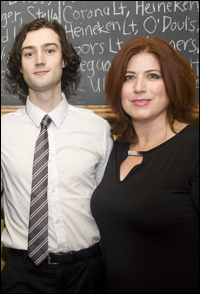 |
||
| Cast members Will Connolly and Anne L. Nathan |
||
| photo by Monica Simoes |
But the producers did supply a secret weapon, according to actor Paul Whitty: "Stephen Gabis is a brilliant voice coach, and he helped us with our dialects."
(Best-known of troupe is veteran character actor David Patrick Kelly, who started out in Is There Life After High School? and is now playing the Da of Guy.)
Tiffany, who said he came to the party disguised as "a gay geography teacher" (that's a narrow tartan tie and a beret), was a little amazed to find himself officially in charge of directing a musical. "Everything I've done has become a musical. I start out with straight plays and they become musicals — Bacchae and Black Watch — and this is the first one that's credited as having a musical book.
"The producers have been very courageous in their appointment of me as the director. I love this show so much, I love the music so much. I only saw the film after I was asked to work on this, actually. It was much bigger here than it was in Britain." Steven Hoggett, Tiffany's directorial deputy, is credited in the program with "Movement," and that, he thinks, pretty much covers his contribution. "John and I had a conversation about what my title would be. I said, 'Choreography wouldn't be the right word because, with this kind of piece, if they dance, we're dead. It's over.'
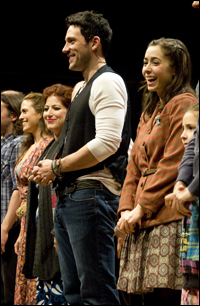 |
||
| Curtain call |
||
| photo by Monica Simoes |
Set and costume designer Bob Crowley, who gets Tonys for fancier stuff than the Dublin tavern he puts forth here, filled the bill as asked. "Doing it as a bar wasn't my idea. We did it in a space in Boston that was like a bar and a club. We used the bar there, but it was black. It was all 1980s. It was like a club rather than an Irish bar, and then John said to me, 'Let's set it in an Irish bar,' and I went, 'Yeah. Okay. I get it. People tell stories and sing in bars.' That's what they did tonight."
He's something of a professional expert at bars. "This particular one is the son of The Iceman Cometh. William Saroyan's The Time of Your Life — that's a bar. I've done them all, so I know what to do. I know all the Irish bars. The best ones are here in New York." Before he gets it up and operative on Broadway, he'll go back to London to do a new play, Traveling Light at the National next month.
The Numero Uno of Once is producer Hart, who was pitched the property by the agent of the film's director, John Carney. "I looked the script over, and I didn't get it at first," Hart admitted. "Then, I saw the movie. Film is a two-dimensional medium, and the stage is three-dimensional. It just cried out to be a show."
Seconding that positive opinion were co-producers Barbara Broccoli and Frederick Zollo, and they were wised up by their 19-year-old daughter, Angelica. Zollo said, "She came to us and said, 'Just listen to it once, and you'll want to do it.' So we listened to the whole score, and she was right."
James C. Nicola, artistic director of NYTW, from which cometh Rent, was clucking contentedly at the party about his little hit-factory incubator and marveling at how easy it was this time: "It was a dream, the whole company — unbelievable actors, singers, players. It's not anything I've ever experienced. It has really inspired me because it seems to me, ultimately, at the bottom of it all, about the fact that human beings can gather together and make something beautiful as opposed to ugly or voracious or exploitative. The times we are living in are so ugly. This reminds us: Yes, we can actually be decent and beautiful."
[flipbook]




































